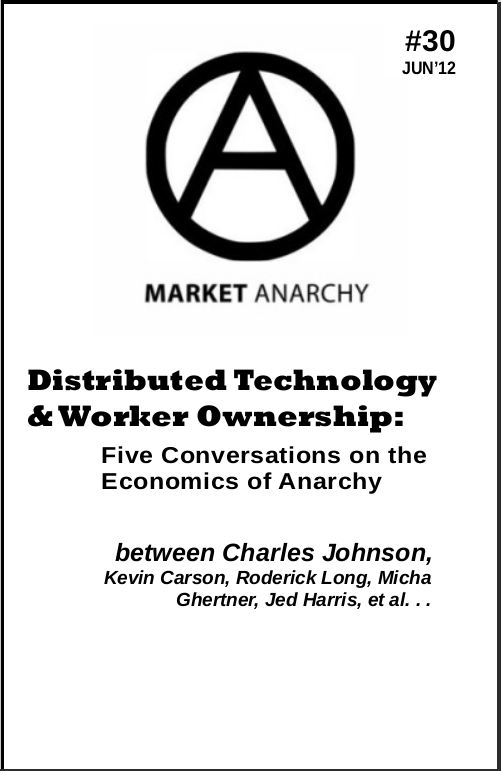C4SS has teamed up with the Distro of the Libertarian Left. The Distro produces and distribute zines and booklets on anarchism, market anarchist theory, counter-economics, and other movements for liberation. For every copy of ALL Distro’s “Distributed Technology & Worker Ownership: Five Conversations on the Economics of Anarchy” that you purchase through the Distro, C4SS will receive a percentage. Support C4SS with ALL Distro’s “Distributed Technology & Worker Ownership: Five Conversations on the Economics of Anarchy“.
$1.00 for the first copy. $0.75 for every additional copy.
This booklet brings together five interconnected conversations on the social and economic aspects of cooperative ownership, worker self-management, and the new possibilities of distributed systems and a distributed form of social ownership of the means of production.
“Which model the distribution of benefits from technological change follows depends, therefore, on who owns the machinery and the technology. And in the present environment, if the distribution of benefits follows the second, unequal model, it’s not the result of any purely technological imperative. Far from it. The more affordable the means of production are to the individual laborer or to small groups of laborers, and the greater the ease of adoption of new technology, the greater the share of total benefits will be appropriated by labor. And the general tendency of the past thirty years has been a cost implosion in production technology. . . .
“Thanks to the desktop revolution in the information industries, an individual computer costing $1000 or less can produce the quality of work in software, music and desktop publishing that once required million-dollar facilities. . . .
“In purely technological terms, the conventional technological unemployment scenario depends on extremely expensive machinery owned by an employer who controls workers’ access to opportunities for employment. And the overwhelming technological trend is away from that state of affairs. . . .”
Includes Charles Johnson’s “How Not To Argue Against Worker Co-Ops” and “King Ludd’s Throne,” essays by Jed Harris and Micha Ghertner, and Kevin Carson’s “Technological Change: Cui Bono?”








